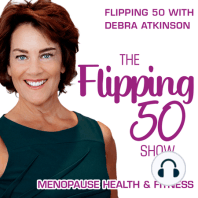35 min listen

Muscle Protein Synthesis in Menopause: How to Plan Pre and Post Workout
Muscle Protein Synthesis in Menopause: How to Plan Pre and Post Workout
ratings:
Length:
27 minutes
Released:
Mar 22, 2024
Format:
Podcast episode
Description
If you’re losing tone, can’t seem to get the results you deserve for the time and energy you spend, you can blame it on part on muscle protein synthesis in menopause. What you did that worked isn’t going to. In the dance between muscle protein synthesis and muscle protein breakdown, you’re MPS is stepping out on you. It’s going to take more effort to win this tango. During menopause transition muscle protein breakdown occurs at a faster rate due to lower levels of Estrogen, not to mention testosterone. Estrogen is a natural stimulus for muscle. The problem is multifaceted. Reduced testosterone (which can start declines much earlier than that in some women). If you’re not sleeping well at night or staying in deep sleep, the times when you do produce testosterone and growth hormone, another important factor in gaining lean muscle, you won’t have those important factors. Also when you don’t sleep at night, too little/poorly, your cortisol and insulin levels are such that you’re in muscle breakdown and fat storage. This is when a woman is in the gym, actually doing the things, and feeling as if she’s not getting rewards, or seeing results. There are two things that stimulate muscle protein synthesis in menopause: -Adequate protein intake on a per meal basis -Adequate mechanical stress to the muscles (resistance training) That decreased muscle protein synthesis results in an increased need for protein (quality protein) Sources that are best are high in leucine. Especially if you’re not consuming much protein or find it hard, you want to lean into leucine. Plant proteins unfortunately don’t have much leucine to help this process. Best sources are animal proteins like beef, bison or wild meats. Here’s where I find some blogs, podcasts, even research findings let us down. Suggestions to supplement with leucine would be well-intended potentially for a frail, older adult unable to consume enough dietary protein, unwilling to or and at later stages of life. But for a midlife woman with the potential for decades ahead of her, the full range of amino acids in the body will be important in her ability to thrive and maintain all areas of health. It’s the difference between hanging on, and better than nothing, and wanting energy and vitality. In consideration of questions like, should I supplement with leucine? My thoughts are, not in isolation if you’re not getting adequate dietary protein. You may want ALSO to supplement specifically with it post workout, or at meals when you aren’t getting adequate protein but I like to see complete essential amino acids first before isolating with greater amounts of individual. Even though, it is and has always been leucine that is associated with lean muscle gains. I began publishing The Protein Report for women in menopause in 2013. It stemmed from a Protein Symposium I had the honor of co-hosting at Iowa State University in honor of Steve Nissen, who had discovered HMB years earlier. If you’re familiar with products Boost and Ensure, you have some awareness of HMB. The ingredient is used more widely now, not only for the drinks intended to help bedridden frail consume high protein drinks to reduce muscle and strength losses. HMB is another supplement question that more frequently comes up today. Should you supplement with HMB. Potentially if you’re struggling with the ability to consume high quality protein sources and you’re at high risk (low body weight, frail, fine boned, weak), it may be something to consider. I also hesitate to suggest it to anyone without first looking at food logs and having you assess what you’re consuming from whole foods. Good News About MPS in Menopause A study in the International Journal of Obstetrics and Gynecology (2022) shows that when women in menopause increase dietary protein, good things happen that can offset potential muscle breakdown AND fat gain. There is a “protein hypothesis” (first published in 2005 in Obesity journal) that goes
Released:
Mar 22, 2024
Format:
Podcast episode
Titles in the series (100)
Take a Walk with a 57-year old Book Author | Just 1400 Miles: If the recent podcast episodes about walking didn’t inspire you to take a walk this episode might. My guest and her husband decided one day to go for a walk. Ninety-eight days later they’re still married, possibly more fit and have things to share... by The Flipping 50 Show